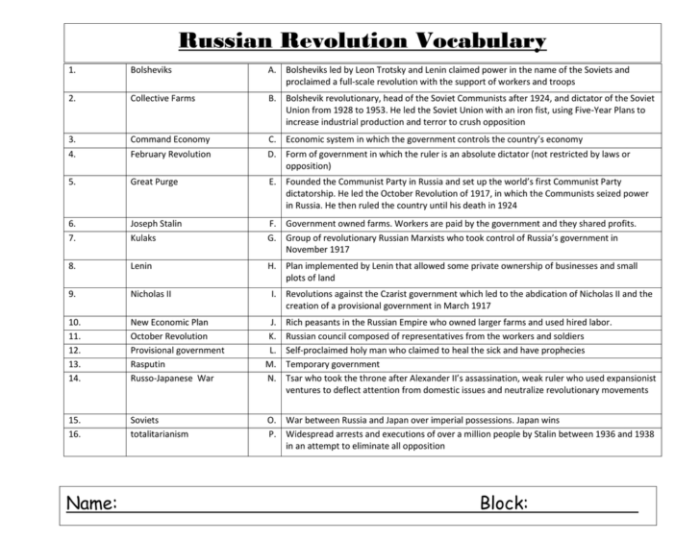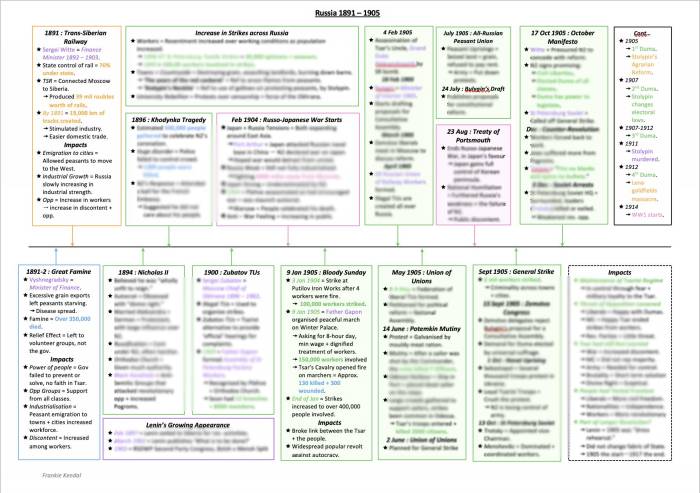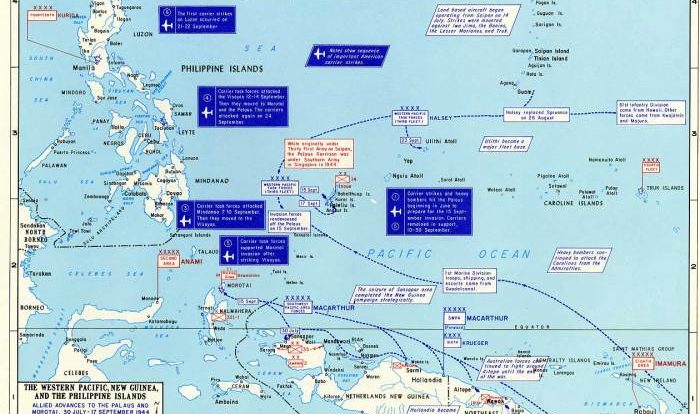Embark on a journey through the Russian Revolution Webquest Answer Key, where the complexities of this pivotal historical event are unveiled. This comprehensive guide delves into the causes, key events, consequences, and legacy of the revolution, providing a thorough understanding of its profound impact on Russia and the world.
From the tumultuous events leading up to the revolution to the establishment of the Soviet Union, this resource illuminates the intricate web of factors that shaped the course of history.
Russian Revolution Webquest Answer Key: Historical Context
The Russian Revolution, a pivotal event in world history, was a complex and multifaceted phenomenon with deep historical roots. The revolution was sparked by a combination of social, economic, and political factors that had been brewing in Russia for decades.
Among the key social factors contributing to the revolution was the vast inequality between the wealthy aristocracy and the impoverished peasantry. The peasantry, which constituted the majority of the population, lived in abject poverty and suffered under oppressive conditions, while the aristocracy enjoyed lavish lifestyles and wielded immense political power.
Economic Factors
Economically, Russia was lagging behind other European nations in terms of industrial development. The country’s economy was heavily dependent on agriculture, and the peasantry was burdened with high taxes and low wages. Industrial workers, who were concentrated in a few major cities, faced harsh working conditions and low pay.
Political Factors
Politically, Russia was an autocratic monarchy ruled by Tsar Nicholas II. The Tsar was an absolute ruler who refused to share power with elected representatives. The government was corrupt and inefficient, and there was widespread discontent among the people.
Key Figures, Russian revolution webquest answer key
Two key figures played a pivotal role in the Russian Revolution: Nicholas II and Vladimir Lenin. Nicholas II, the last Tsar of Russia, was a weak and indecisive leader who failed to address the growing unrest in the country. Vladimir Lenin, the leader of the Bolshevik Party, was a brilliant revolutionary who organized the workers and peasants and led them to victory in the revolution.
Causes of the Russian Revolution: Russian Revolution Webquest Answer Key
The immediate cause that triggered the Russian Revolution was Russia’s involvement in World War I. The war placed a heavy burden on the Russian economy and society, and it led to widespread shortages of food and other essential goods. The war also resulted in the deaths of millions of Russian soldiers, which further alienated the people from the Tsarist regime.
The Bolshevik Party, led by Vladimir Lenin, played a key role in organizing and leading the revolution. The Bolsheviks exploited the discontent among the people and promised to establish a socialist government that would address the needs of the workers and peasants.
Key Events of the Russian Revolution

The Russian Revolution unfolded in a series of key events:
- February Revolution (March 1917):Workers and soldiers in Petrograd (later renamed Leningrad) rioted over food shortages and poor working conditions. The Tsar was forced to abdicate, and a provisional government was established.
- October Revolution (November 1917):The Bolsheviks, led by Lenin, seized power in Petrograd and overthrew the provisional government. The Bolsheviks established a socialist government and began to implement radical reforms.
- Civil War (1918-1921):The Bolsheviks faced opposition from anti-communist forces, including the White Army, which was supported by Western powers. The Bolsheviks eventually emerged victorious from the civil war and established the Soviet Union.
Consequences of the Russian Revolution
The Russian Revolution had a profound impact on Russia and the world.
In Russia, the revolution led to the establishment of the Soviet Union, a socialist state that would become a global superpower. The Soviet Union implemented radical economic and social reforms, including the nationalization of industry and the collectivization of agriculture.
The Russian Revolution also had a major impact on global politics. The revolution inspired communist movements around the world, and it led to the Cold War between the United States and the Soviet Union.
Legacy of the Russian Revolution

The Russian Revolution continues to be a subject of debate and controversy. Some historians view it as a positive event that led to the overthrow of a tyrannical regime and the establishment of a more just and equitable society. Others view it as a negative event that led to the rise of a totalitarian dictatorship and the deaths of millions of people.
Regardless of one’s perspective, there is no doubt that the Russian Revolution was a watershed moment in world history. It marked the end of the old order and the beginning of a new era.
Questions and Answers
What were the primary causes of the Russian Revolution?
The revolution was fueled by a combination of social, economic, and political factors, including widespread poverty, inequality, political oppression, and the impact of World War I.
Who were the key figures involved in the revolution?
Nicholas II, the last Tsar of Russia, and Vladimir Lenin, the leader of the Bolshevik Party, played pivotal roles in the revolution.
What were the major events of the revolution?
The February and October Revolutions were key events that led to the overthrow of the Tsarist regime and the establishment of the Soviet Union.
